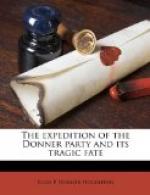Early in her sorrow, she had prayed that death might come to her in the season when the snow lay deep on Siberia’s plain; and her prayer was realized, for it was on a bleak winter morning that we pupils gathered in silence around the breakfast table, knowing that Sister Dominica lay upon her bier in the chapel.
The meal was nearly finished when Sister Amelda entered, and spoke to a couple of the Spanish young ladies, who bowed and immediately withdrew. As she came down the line selecting other Spanish friends of the dead, she stopped beside me long enough to say:
“You also may go to her. You comforted her in life, and it is fitting that you should be among those who keep the last watch, and that your prayers mingle with theirs.”
After her burial, which was consecrated by monastic rites, I returned to the schoolroom with reverential memories of Sister Dominica, the once “beautiful angel in black.”
The school year closed in July, 1858, and I left the convent with regret. The gentle, self-sacrificing conduct of the nuns had destroyed the effect of the prejudicial stories I had heard against conventual life. The tender, ennobling influences which had surrounded me had been more impressive than any I had experienced during orphanhood, and I dreaded what the noisy world might again have in store for me.
My sister Frances and William R. Wilder, who had been betrothed for more than a year, and had kept their secret until we three returned from the convent, were married November 24, 1858, and soon thereafter moved to a pleasant home of their own on a farm adjoining Rancho de los Cazadores. The following January, Georgia and I entered public school in Sacramento, where we spent a year and a half in earnest and arduous study.
[Footnote 17: The subject of a poem by Bret Harte, and of a novel by Mrs. Gertrude Atherton.]
CHAPTER XXXV
THE CHAMBERLAIN FAMILY, COUSINS OF DANIEL WEBSTER—JEFFERSON GRAMMAR SCHOOL—FURTHER CONFLICTING ACCOUNTS OF THE DONNER PARTY—PATERNAL ANCESTRY—S.O. HOUGHTON—DEATH TAKES ONE OF THE SEVEN SURVIVING DONNERS.
Our school home in Sacramento was with friends who not only encouraged our desire for knowledge, but made the acquirement pleasant. The head of the house was Mr. William E. Chamberlain, cashier of D.O. Mills’s bank. His wife, Charlotte, was a contributor to The Sacramento Union and leading magazines. Their daughter, Miss Florence, taught in the public schools; and their son, William E., Jr., was a high-school student, preparing for Harvard.




